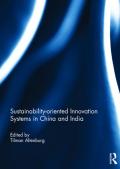
This paper analyses the role of behavioural factors for the energy management of micro and small enterprises (MSEs) in Sub-Sahara Africa for the first time. Drawing on semi-structured interviews and focus group discussions in Uganda, it finds that behavioural barriers impeding energy efficiency contribute to the limited performance of MSEs in Uganda. Limited self-control and short-term thinking, habits, a status quo bias and a lack of trust impede the uptake of energy efficiency, while first-hand experience with efficient technology, implementation intentions and social learning can be conducive. Behavioural insights on energy efficiency therefore present another piece of the puzzle on MSE performance.
This paper analyses the interdependency of water and energy in India’s wastewater sector. Wastewater treatment plants consume a great deal of energy. Energy-efficient technologies are available, but are only spreading slowly in developing countries. In India, only 10% of all wastewater generated is treated, while energy demand is soaring. The case for investments in energy-efficient solutions thus seems clear. This case study analyses under which conditions and with which instruments integrated approaches to the water, energy and food (land) sectors (WEF-Nexus) are useful in various different wastewater systems across the country. It focuses on the identification of existing drivers of and barriers to the diffusion of energy-efficient technologies in India’s urban wastewater sector, uncovering how investments in resource- and lifecycle-oriented solutions could be enhanced.

Transforming the world economy towards sustainability, while ensuring decent levels of resource use for all global citizens, is the greatest challenge of our time. This book explores how innovation systems need to be adapted to successfully confront these challenges. The first chapter introduces the concept of sustainability-oriented innovation systems which highlights the systematic differences between systems that have developed along current resource-intensive technological trajectories and those that address the impending environmental mega-problems. The subsequent articles present case studies of sustainability-oriented innovations in a number of policy areas, including energy efficiency, electric mobility and generation of renewable energy, in China and India. These case studies confirm the specificities of innovation systems geared towards a green techno-economic paradigm.
Achieving the 2030 Agenda will be a challenge for all countries. It is however particularly salient for the 48 Least Developed Countries, where levels of deprivation are acute, infrastructure is inadequate, economies are vulnerable and capital is in short supply. Yet these are the countries we need to reach first if we are to meet the aspiration to “leave no on behind”.
Sustainable economic growth needs to be the primary objective of every government, including developing Asian countries, to improve the social welfare of the people. Therefore, to achieve the desirable level of sustainable economic growth, environmental degradation must be controlled without lowering real growth and the well-being of the society. This study empirically investigates the impact of environmental degradation by CO2 emissions on the economic growth of 11 Asian countries between 1990 and 2011. Based on the nature of the data, traditional panel estimation techniques encompassing fixed effects and random effects are employed, in which the results of Hausman's test and other tests show that the use of fixed effects is preferable over the random-effect estimator. Empirical results exhibit that environmental degradation has a significantly negative impact on economic growth. Empirical findings also suggest that environmental degradation should be regulated. Therefore, environmentally enlightened management policies for the decrease of CO2 emissions and fuel consumption by transportation and industries need to be pursued by Asian countries.
